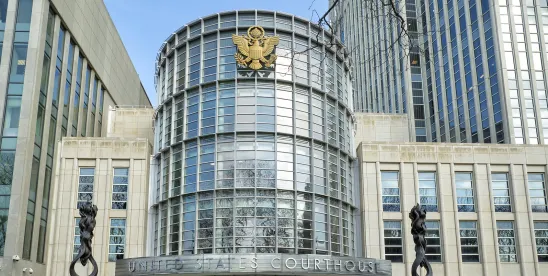On August 21, a group of trade organizations filed an amicus brief in support of a motion to dismiss filed by a subprime auto lender that is the target of a joint enforcement action brought by the CFPB and the New York State Office of the Attorney General in the Southern District of New York. The underlying complaint alleges that the auto lender misrepresented costs in loan agreements and tricked customers into high-cost loans on used cars in violation of the CFPA and New York usury limits (see previous blog post here). In particular, the complaint alleges that: (1) the auto lender’s business model allegedly incentivizes vehicle dealers to inflate vehicle prices so that the true finance charges in the retail installment contracts that dealers originate are hidden from consumers; and (2) the lender fails to assess consumers’ ability to pay prior to extending credit.
The amici advance two primary arguments against the CFPB’s case and in support of the auto lender’s motion the dismiss:
- First, the claims in the action continue a long-standing pattern of regulatory overreach by the CFPB and should be checked post-Loper, which warned that administrative agency actions should be limited to the authority granted to them by Congress. In particular, the Dodd-Frank Act expressly excludes dealerships from the Bureau’s rulemaking, enforcement, and supervisory authority. However, the Bureau attempts to circumvent this restriction and indirectly regulate auto dealers by attempting to impose liability on auto lenders for the alleged actions of dealers. Moreover, neither auto dealers nor finance companies are required to disclose dealer discounts as a finance charge under TILA unless those discounts are separately imposed on consumers, and even if they were, those violations cannot be imputed to a lender. Yet, the Bureau has charged the lender with such violations. Finally, the amici submit that the CFPB asks the court to disregard Congressional policy choices by mandating even more prescriptive ability-to-repay rules for other creditors on the theory that it is “abusive” not to evaluate credit applications in precisely the way the CFPB now declares they should be evaluated.
- Second, the amici argue that the CFPB’s novel legal theories will undermine well-established commercial relationships in the indirect auto finance industry and significantly restrict the availability of credit to consumers, particularly those in the subprime market. By attempting to make finance companies liable for alleged violations of TILA by dealers or retailers, the amici contend that the CFPB’s claims could make it riskier and less likely for finance sources to make credit available to retail purchasers.
The brief further highlights that, if permitted to proceed past the pleading stage, the CFPB’s theories could have widespread chilling effects in the auto finance industry and beyond.
Putting it into Practice: As expected, the Supreme Court’s Loper decision has already begun to feature prominently in challenges to agency action (as previously discussed here). The trade associations’ amicus brief is noteworthy in that in previews how litigants may use Loper not only as a sword to challenge agency rulemaking, but also as a shield in defending against agency enforcement actions.



 />i
/>i

